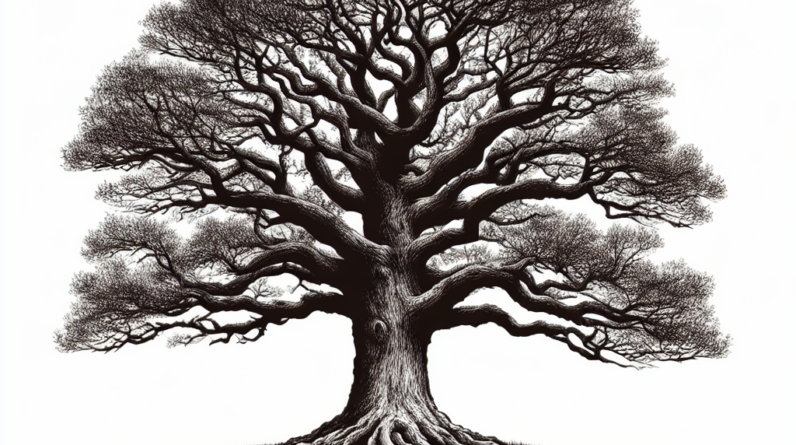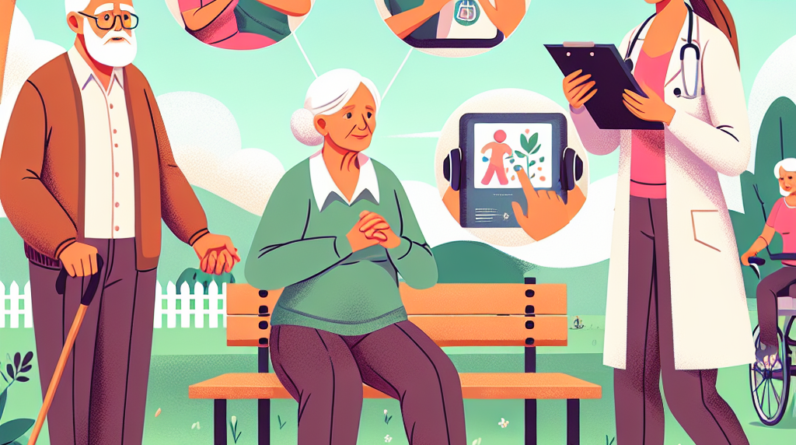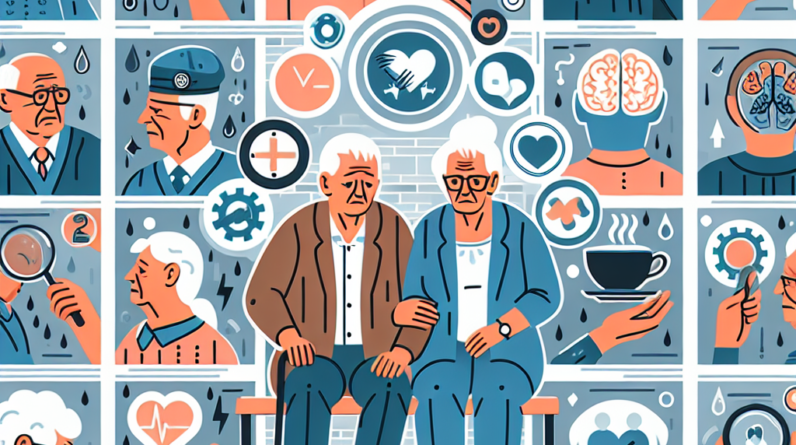
As you journey through the stages of life, the impact of aging on mental health becomes a significant concern. The challenges we face as we grow older can deeply affect our mental well-being. From issues with mental health that may arise to the various psychological factors that influence the elderly, it is crucial to explore and understand the complexities of this relationship. This article aims to shed light on the impact of aging on mental health, offering insights into the unique struggles and experiences faced by older adults.
Physical and Cognitive Decline

Impact of Physical Health on Mental Health
As you age, it’s important to recognize that physical health and mental health are closely intertwined. The state of your physical well-being can significantly impact your mental well-being. When faced with physical health challenges, such as chronic pain, mobility issues, or chronic illnesses, it can take a toll on your mental health. You may experience feelings of frustration, sadness, or even develop symptoms of anxiety or depression. It’s crucial to address both your physical and mental health to ensure a holistic approach to overall well-being.
Cognitive Changes and Mental Health
Cognitive changes, such as memory loss or difficulty with problem-solving, can also impact your mental health as you age. This is particularly true when these changes interfere with your daily functioning and independence. Feeling a loss of control or a sense of incompetence can lead to feelings of distress, frustration, and even contribute to the development of mental health conditions. It’s essential to monitor changes in cognitive function and seek appropriate support or interventions to maintain optimal mental health.
Early Signs of Dementia and Its Effects on Mental Health
One of the most significant concerns regarding cognitive decline in older adults is the progression of dementia. Early signs of dementia, such as forgetfulness, confusion, or trouble with language, can be distressing for both the individual experiencing these symptoms and their loved ones. The effects of dementia on mental health can be profound, leading to feelings of fear, frustration, and a sense of loss of self. It’s crucial to seek medical attention if you or a loved one exhibit these signs to ensure early intervention, support, and appropriate management of mental health throughout the progression of the disease.
Psychosocial Challenges
Social Isolation and Loneliness
As you age, you may experience changes in your social circle, loss of loved ones, or reduced mobility, which can contribute to social isolation and feelings of loneliness. Social isolation and loneliness have a significant impact on mental health and well-being. It can lead to increased risk of developing mental health conditions such as depression and anxiety. It’s important to recognize the importance of social connections and actively seek opportunities to engage with others, whether it’s joining community groups, participating in hobbies, or utilizing technology to stay connected with friends and family.
Loss of Loved Ones and Grief
The loss of loved ones is an inevitable part of life, and as you age, you may experience the loss of family members, friends, or even spouses. Dealing with grief in older adulthood can be particularly challenging as you navigate your own mortality and face the reality of loss more frequently. Grief can have a profound impact on mental health, leading to feelings of sadness, guilt, anger, or even depression. Seeking support from friends, family, or grief support groups can help you navigate through the grieving process and promote mental well-being.
Adjusting to Retirement and Changes in Roles
Retirement is a significant life transition that can affect your mental health. It often involves a shift in daily routines, changes in financial circumstances, and adjustments to your sense of identity and purpose. Some individuals may struggle with feelings of loss, lack of direction, or a sense of emptiness in the absence of their previous work roles. It’s important to find new sources of meaning and fulfillment in retirement, whether it’s through pursuing hobbies, engaging in volunteer work, or exploring new interests. Adjusting to these changes and finding a sense of purpose can contribute to positive mental health outcomes.
Financial Stress and Insecurity
Financial stress and insecurity are common concerns for older adults, particularly in a society where the cost of healthcare, housing, and daily expenses continue to rise. Financial challenges can lead to anxiety, depression, and a sense of helplessness. It’s crucial to seek guidance from financial advisors or professionals to help manage your financial resources effectively. Exploring available resources, such as government programs or community organizations, can provide additional support and alleviate some of the financial stress associated with aging.
Prevalence of Mental Disorders in Aging
Depression and Anxiety Disorders
Depression and anxiety disorders are prevalent mental health conditions in older adults. It’s essential to recognize that these conditions are not a normal part of aging and can significantly impact quality of life. Older adults may be more prone to developing these conditions due to factors such as physical health challenges, social isolation, or loss of loved ones. Recognizing the signs and symptoms of depression and anxiety, such as persistent sadness, changes in sleep patterns, or excessive worry, is imperative for early intervention and appropriate treatment.
Substance Abuse and Addiction
Substance abuse and addiction can also affect older adults, although it may be underdiagnosed or overlooked compared to other age groups. Retirement, loss of social connections, or the presence of chronic pain may contribute to the development or continuation of substance abuse issues. It’s essential to address substance abuse concerns promptly through interventions such as counseling, support groups, or specialized treatment programs to ensure the well-being and safety of older adults.
Psychotic Disorders and Schizophrenia
While less common than other mental health conditions in older adults, psychotic disorders such as schizophrenia can persist or develop later in life. Older individuals with schizophrenia may face unique challenges due to age-related physical health concerns and cognitive changes. It’s crucial for healthcare professionals to accurately diagnose and provide appropriate treatment and support for older adults living with psychotic disorders to promote optimal mental health outcomes.
Bipolar Disorder and Mood Swings
Bipolar disorder is characterized by extreme shifts in mood, ranging from manic episodes to depressive episodes. Older adults living with bipolar disorder may face additional challenges due to the impact of aging on physical health and cognitive function. Managing bipolar disorder in older adulthood may require a tailored approach, including medication management, psychotherapy, and support from healthcare professionals. It’s essential to communicate openly with your healthcare team about any mood swings or changes in mental health to ensure appropriate management of this condition.
Impact on Quality of Life
Impaired Emotional Well-being
Mental health challenges in older adulthood can significantly impact emotional well-being. Mental health conditions such as depression or anxiety can lead to persistent feelings of sadness, worry, or irritability that interfere with daily functioning and enjoyment of life. It’s vital to prioritize emotional well-being by seeking appropriate support, engaging in self-care activities, and developing coping strategies to promote a positive outlook and overall quality of life.
Decline in Functioning and Independence
A decline in physical and cognitive functioning may impact your ability to perform daily activities independently. This loss of independence can contribute to feelings of frustration, sadness, or even a sense of decreased self-worth. It’s crucial to adapt to these changes by utilizing assistive devices, modifying environments to enhance safety, and seeking support from healthcare professionals or caregivers. Maintaining as much autonomy as possible can contribute to a sense of purpose and overall well-being.
Negative Effects on Physical Health
The impact of mental health on physical health should not be overlooked. Mental health conditions can contribute to an increased risk of developing or exacerbating physical health concerns such as cardiovascular disease, diabetes, or chronic pain. It’s essential to address both mental and physical health needs simultaneously, working closely with healthcare professionals to create an integrated care plan that promotes overall well-being and optimal health outcomes.
Reduced Social Participation
Mental health challenges in older adulthood can lead to reduced social participation and engagement in meaningful activities. This withdrawal from social interaction can further exacerbate feelings of loneliness, isolation, and may contribute to the development or worsening of mental health conditions. It’s important to actively seek opportunities for social connection and engagement, whether it’s through joining community groups, participating in hobbies, or utilizing technology to maintain relationships. Maintaining social participation is crucial for mental well-being and overall quality of life.
Risk Factors and Vulnerabilities
Previous Mental Health Issues
Individuals who have experienced mental health issues earlier in their lives may be at increased risk of developing mental health challenges in older adulthood. It’s important to recognize any previous mental health history and seek appropriate support as you age. Regular check-ins with healthcare professionals and open dialogue about mental health can help identify any concerns early on and facilitate appropriate interventions or treatment.
Chronic Health Conditions
Chronic health conditions, such as heart disease, diabetes, or arthritis, can significantly impact mental health in older adults. The burden of managing multiple health conditions, coupled with physical limitations and daily challenges, can increase the risk of developing mental health conditions or exacerbating existing ones. It’s crucial to prioritize self-care, work closely with healthcare professionals to manage chronic conditions effectively, and seek support or interventions to address any mental health concerns.
Genetic Predisposition
Family history and genetics can play a role in determining your vulnerability to certain mental health conditions. It’s essential to be aware of any family history of mental health disorders and communicate this information with healthcare professionals. This knowledge can help guide appropriate screenings, interventions, or monitoring to ensure early detection and effective management of any potential mental health concerns.
Unhealthy Coping Mechanisms
Unhealthy coping mechanisms, such as excessive alcohol consumption, tobacco use, or self-isolation, can contribute to the development or exacerbation of mental health conditions in older adults. It’s important to be mindful of your coping strategies and seek healthier alternatives such as engaging in physical activity, practicing relaxation techniques, or seeking support from loved ones or professionals. Promoting positive coping mechanisms can significantly contribute to your mental well-being and overall quality of life.
Barriers to Mental Health Care
Stigma and Ageism
Stigma and ageism surrounding mental health can create significant barriers to accessing appropriate care and support. Older adults may face misconceptions or negative attitudes from healthcare professionals, family members, or even within their communities. This can lead to a reluctance to seek help or discuss mental health concerns openly. Education and awareness campaigns designed to challenge stigma and ageism are essential to ensure older adults receive the care they deserve.
Lack of Accessible Services
Limited access to mental health services, particularly in more remote or underserved areas, can pose a challenge for older adults seeking support. This limited availability of services can result in delayed or inadequate treatment, leading to further deterioration of mental health conditions. It’s crucial for policymakers, healthcare systems, and community organizations to prioritize the accessibility of mental health services for older adults, ensuring that support is readily available when needed.
Limited Awareness and Education
A lack of awareness and education surrounding mental health in older adulthood can contribute to under-recognition or underreporting of mental health concerns. Older adults, their families, and even healthcare professionals may not be sufficiently informed about the signs, symptoms, or appropriate interventions for mental health conditions in older adults. Enhancing awareness and education through public health initiatives, support groups, and community workshops can empower individuals to recognize and address mental health challenges effectively.

Financial Constraints
Limited financial resources can present a significant barrier to accessing mental health care and support. The cost of medications, therapy sessions, or specialized treatments may be prohibitive for some older adults, particularly those living on fixed incomes or without adequate insurance coverage. Addressing financial constraints may require exploring available resources, such as government programs, financial assistance, or community-based services that can help mitigate the financial burden associated with mental health care.
Interventions and Support
Psychotherapy and Counseling
Psychotherapy or counseling can be highly beneficial for older adults struggling with mental health challenges. Engaging in talk therapy can provide a safe and non-judgmental space to explore emotions, develop coping strategies, and gain a better understanding of oneself. Therapists with experience in geriatric mental health can address specific concerns related to aging and help older adults achieve optimal mental well-being.
Medication Management
In some cases, medication may be prescribed to manage mental health conditions in older adults. It’s important to work closely with healthcare professionals to find the right medication and dosage that suits individual needs. Regular monitoring and open communication with healthcare providers are essential to ensure the medication is effective and to manage any potential side effects or interactions with other medications.
Supportive Housing and Assisted Living
For older adults who require additional support or more structured care, supportive housing or assisted living facilities can provide a safe and supportive environment. These settings often offer on-site healthcare services, social activities, and access to mental health professionals who specialize in working with older adults. Supportive housing or assisted living can be a valuable option for those seeking a greater level of assistance while promoting mental health and overall well-being.
Community-Based Programs and Social Support
Community-based programs and social support networks can play a crucial role in promoting mental health and well-being in older adulthood. These programs offer opportunities for social connection, engagement in meaningful activities, and access to resources or services tailored to the needs of older adults. Whether it’s joining local clubs, participating in senior centers, or attending community events, engaging in these programs can provide a sense of belonging, reduce social isolation, and enhance mental well-being.
Promoting Resilience and Well-being
Healthy Lifestyle Choices
Making healthy lifestyle choices is essential for promoting mental well-being in older adulthood. Regular exercise, maintaining a balanced diet, and prioritizing sleep can have significant positive impacts on mental health. Additionally, avoiding excessive alcohol consumption and refraining from tobacco use can help maintain optimal mental well-being. Incorporating these healthy choices into daily routines can contribute to resilience and overall well-being as you age.
Engaging in Meaningful Activities
Engaging in activities that bring joy and a sense of purpose is crucial for promoting mental health in older adulthood. Whether it’s pursuing hobbies, volunteering, or engaging in creative endeavors, finding activities that provide a sense of fulfillment can contribute to a positive outlook and overall well-being. It’s important to prioritize these activities and make time for them regularly to maintain a strong sense of purpose and satisfaction.
Maintaining Social Connections
Social connections are vital for mental well-being, regardless of age. Maintaining relationships with loved ones, friends, and community members can help ward off feelings of loneliness or social isolation. Utilizing technology to stay connected with long-distance loved ones or joining community groups that share common interests can help foster and maintain social connections. Actively nurturing these relationships will contribute to a sense of belonging and overall mental well-being.
Enhancing Cognitive Function
Keeping your mind active and engaged is crucial for maintaining cognitive function and promoting mental health as you age. Engaging in activities that challenge your brain, such as puzzles, reading, or learning new skills, can help keep your mind sharp and stave off cognitive decline. Additionally, staying intellectually curious and seeking opportunities for lifelong learning can promote mental well-being and a sense of accomplishment.
Cultural and Diversity Considerations
Cultural Attitudes towards Aging and Mental Health
Different cultures have varying attitudes towards aging and mental health, which can influence how older adults perceive and approach mental health concerns. It’s essential to consider cultural beliefs, values, and traditions when addressing mental health challenges in older adults from diverse backgrounds. Promoting culturally sensitive care, incorporating cultural practices or beliefs, and involving family members or community leaders can help reduce stigma, increase access to care, and improve overall mental well-being.
Language and Communication Barriers
Language and communication barriers can pose significant challenges in providing adequate mental health care to older adults from diverse backgrounds. It’s crucial to employ interpreters or utilize language services to ensure effective communication between healthcare professionals and older adults. Culturally competent healthcare professionals who can understand and navigate cultural nuances can help overcome language barriers and ensure that older adults receive the care they need.
Addressing Specific Needs of Minority Elderly
Minority elderly populations often face unique challenges related to mental health, such as discrimination, disparities in access to care, or lower rates of help-seeking behavior. It’s essential to address these specific needs by developing culturally sensitive mental health programs or interventions that target minority elderly populations. Collaborating with community leaders, advocates, or culturally diverse healthcare professionals can help ensure that mental health services are inclusive, accessible, and meet the unique needs of these populations.
Role of Caregivers and Family
Understanding Caregiver Stress and Burnout
Caregivers play a vital role in supporting the mental health and well-being of older adults. However, caregiving can also be demanding and emotionally draining, leading to caregiver stress or burnout. Caregivers may experience feelings of isolation, exhaustion, or guilt, which can impact their mental health. It’s important for caregivers to prioritize self-care, seek support through respite care services or support groups, and communicate their needs to other family members or healthcare professionals. By recognizing and addressing caregiver stress, both the caregiver and the older adult can benefit from improved mental well-being.
Providing Emotional and Practical Support
Family members and loved ones can provide valuable emotional and practical support to older adults experiencing mental health challenges. Offering a listening ear, providing reassurance, and engaging in open and non-judgmental conversations can foster a sense of support and understanding. Additionally, assisting with practical tasks such as transportation to appointments, medication management, or assistance with daily activities can alleviate some of the burdens associated with mental health conditions and promote overall well-being.
Collaborating with Healthcare Professionals
Collaboration between family members and healthcare professionals is crucial in ensuring optimal mental health care for older adults. Family members can provide valuable insights into the individual’s well-being, observe changes in behavior or mood, and communicate concerns to healthcare professionals. Collaborating with healthcare professionals, sharing information, and actively participating in the care plan can help ensure that the older adult receives appropriate support and interventions.
Seeking Respite Care and Support Groups
Caregivers can benefit from seeking respite care services, which provide temporary relief from caregiving responsibilities. This break can allow caregivers to rest, recharge, and take care of their own mental and physical well-being. Support groups for caregivers can also offer valuable opportunities to connect with others who share similar experiences, learn coping strategies, and gain emotional support. Prioritizing self-care and seeking respite care or support through caregiving networks can contribute to the overall mental health and well-being of both the caregiver and the older adult.
In conclusion, aging brings about numerous changes and challenges that can impact mental health. Physical and cognitive decline, psychosocial challenges, and the prevalence of mental disorders in aging are all factors that need to be considered in promoting mental well-being in older adults. Recognizing the risk factors and vulnerabilities, as well as addressing the barriers to mental health care, is crucial in ensuring that older adults receive the support and interventions they need. With proper interventions, support from caregivers and family, and a focus on promoting resilience and well-being, older adults can maintain optimal mental health and enjoy a high quality of life in their later years.







